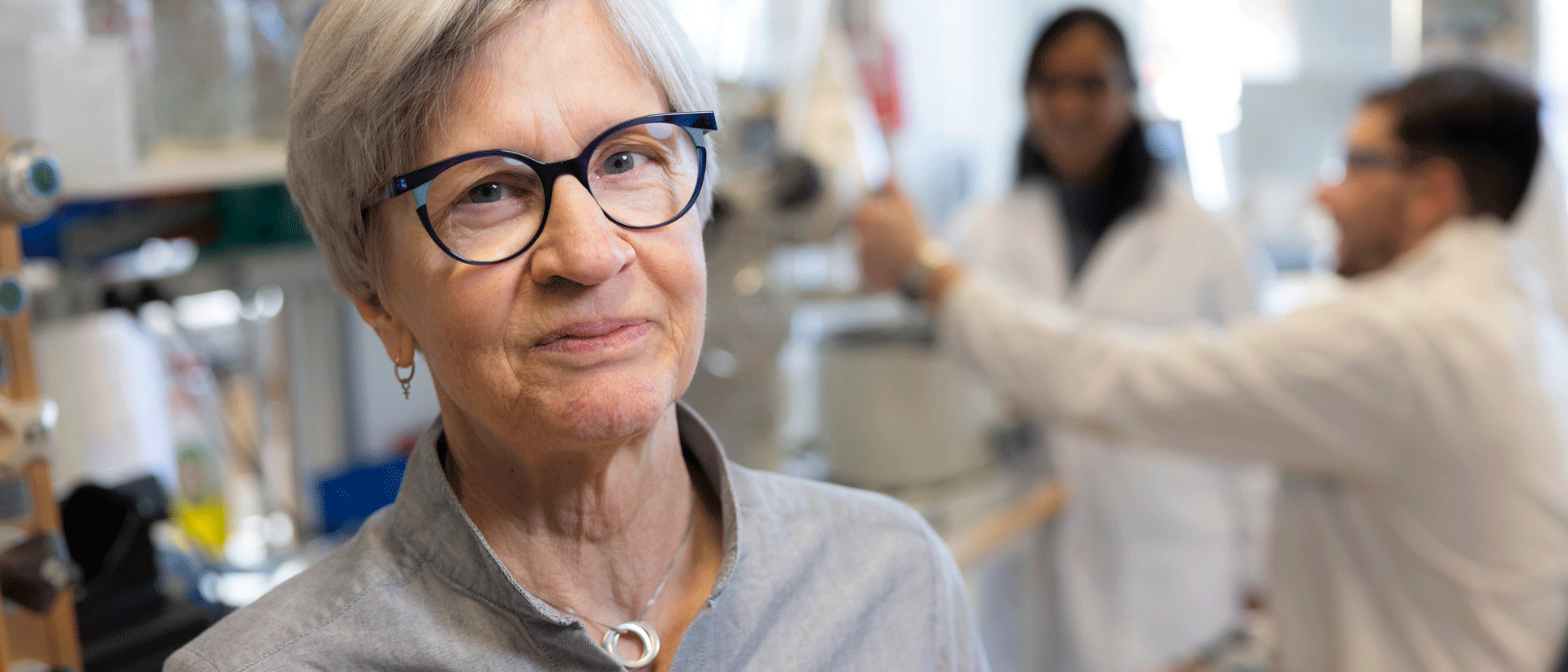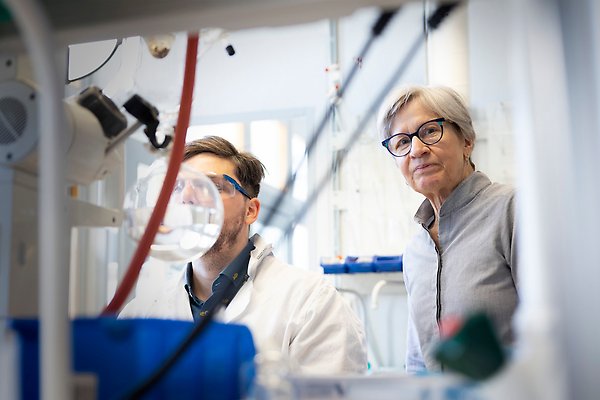She is keen to increase gender awareness in research and teaching
Researcher profile

“We need an increased gender perspective in science teaching,” says Anita Hussénius, a researcher at the Centre for Gender Research.
How are we affected by our environment and the materials around us? Just how gender equal are courses and programmes today and what part do gender stereotypes play in who learns what? Anita Hussénius is the Director of the National Centre for Knowledge on Men's Violence Against Women and a researcher at the Centre for Gender Research; she conducts research on the borders between pedagogy and natural science.
With a background in chemistry, Anita Hussénius has spent many years working at both Uppsala University’s Faculty of Science and Technology and the University of Gävle. Her interest in gender issues was stoked by years spent in senior positions in male-dominated environments.
“It became abundantly clear that factors other than performance and academic qualifications decided for whom career doors were opened and for whom they remained firmly closed,” says Hussénius.
This interest in gender issues eventually led Hussénius to the Centre for Gender Research, then under the direction of professor of comparative literature Margareta Fahlgren, who had been awarded a grant by the Swedish Research Council to build up an interdisciplinary centre of excellence for gender studies.
“The centre attracted many international visiting research fellows with varying backgrounds and an extremely dynamic environment developed there,” says Hussénius. “It can be dizzying but at the same time highly beneficial to learn how researchers from other disciplines think about different issues and to have one’s assumptions called into question. I think it was educational for both us as scientists and for researchers from the humanities and social sciences who spent time in the environment.”
Preventing gender-stereotyped career choices
Adopting a gender perspective on science and teaching implies critically reviewing and deepening one’s understand of the role of sex/gender in these contexts, so that one can acquire knowledge about the processes through which gender differences are created, reproduced and perpetuated, or indeed changed.
Gender-stereotypes associated with science are relatively common, making it important to increase gender awareness, especially among students on teacher education programmes as they in turn can have a significant impact on their future pupils.
“If prospective physics, biology and chemistry teachers are made aware of the gender aspects of science and of their own internalised preconceptions, this may have a positive effect on their teaching. In the long term, it may help to minimise the risk of pupils making stereotypical study and career choices,” says Hussénius.
Material dysfunctionality
One consequence of successful, niche research organisations is that both instrument parks and simpler laboratory equipment are governed by the needs of research. While there are laboratories with standard equipment available to courses, to a large extent the equipment acquired to meet research needs is also used for teaching.
Hussénius uses the term material dysfunctionality to describe how such an environment, with its limitations in terms of equipment, can create varying degrees of problems.
As Hussénius explains: “For a student undertaking a degree project beyond the scope of the niche research organisation, for example, the consequences of material dysfunctionality – i.e., the material has not worked optimally in relation to the purpose of the task – may be poorer performance or even the failure of the experiment”.
This in turn presents the risk that the student’s competence will be called into question by others working there. This risk increases if the student is a woman or someone else who, for whatever reason, is deemed different or challenging to the prevailing male-dominated culture.
“It is therefore vital to be aware of the limitations of the material but also of the significance of language, subject discourse and different expressions in the culture of the organisation; otherwise, students and other subordinates in particular will find themselves in situations where they are judged unfairly based on stereotypes. This is true regardless of whether it takes place in a laboratory setting or in some other subject area. Materials awareness is a prerequisite for preventing the label incompetent being applied to individuals when, actually, it is the material that is at fault.”

“We need to be challenged and to reassess our own and other people’s preconceptions,” says Anita Hussénius. Photo: Mikael Wallerstedt
Men and women are treated differently in academia
Greater gender awareness is crucial to efforts to achieve gender equality, equal opportunities and equal treatment in academic environments. Teachers and students alike bear with them preconceptions and norms.
“We must be conscious that gender aspects are always with us; they permeate and affect our organisations in various ways and at all levels,” Hussénius continues. “For example, this has been demonstrated when gender observers attend assessments of applications for external research funding. They draw attention to differences in the reasoning of assessors depending on whether the main applicant is a woman or man.”
We encounter and are socialised to accept gender norms from an early age and active efforts are required to achieve gender equality. We need to be challenged and to reassess our own and other people’s preconceptions about who can, should, wants to or is suitable to do what.
We need change on many levels and I am inspired by those committed people who have the courage to work towards this,” says Hussénius. “Work in the entire area of gender equality is progressing painfully slowly, even in academia.”
Men’s violence against women
Although dogged gender-equality efforts have been underway in society’s various arenas for many years, the balance of power remains detrimental to women. Hussénius encounters the most extreme consequences of gender inequality in her present role as the Director of the National Centre for Knowledge on Men's Violence Against Women.
“If one examines all lethal violence perpetrated against women in Sweden during the period 2017–2021, over 60 percent of fatalities were the result of intimate partner violence, i.e., they were murdered by their husband or partner. The corresponding figure for men is 3.5 per cent. Women are more likely to be killed in their home by those closest to them, while men are killed outside the home by an outsider. This is the most alarming expression of Sweden’s structural gender inequality.”
The National Centre for Knowledge on Men's Violence Against Women is a collaboration between Uppsala University and Region Uppsala. The centre is tasked by the Swedish Government with increasing knowledge about and supporting the victims of men’s violence against women.
“There is enormous potential and strength in having an academic department at the University, conducting research and education and disseminating knowledge, working side by side with the clinical unit at Uppsala University Hospital and the National Helpline for Women,” says Hussénius.
“The practical organisation – healthcare professionals who meet and support abused women – and teachers, researchers and communications officers meet on a daily basis in the same building and within the same organisation. While we are working with grim matters, it is an incredibly important business and one that it is a privilege to be part of.”
Cecilia Yates
Facts: Anita Hussenius
Title: Docent, Director of the National Centre for Knowledge on Men's Violence Against Women and a researcher at the Centre for Gender Research.
Background: Doctor of Philosophy in Organic Chemistry, extensive research background in reaction mechanisms in chemistry and in gender studies at the Centre for Gender Research. Several senior appointments, including Head of the Department of Chemistry at Uppsala University, Head of the Department of Mathematics, Natural Science and Computer Science at the University of Gävle and Director of the National Centre for Knowledge on Men's Violence Against Women.
Leisure interests: Getting out and about in nature, whether that be enjoying the countryside or cross-country skiing and ice skating.
Currently reading: The Summer House, Later by Judith Hermann.
Makes me happy: Humour at its best.
Makes me angry: Privatisation and the dismantling of the public sector. The introduction of New Public Management. Time for research and teaching was reduced when document production, accounts and reporting were transferred to researchers and clinics from the administration and support organisation that are experts in that very thing.
Engages me: Driven people who want to change society for the better. It is not simply the thing itself, but the commitment to the change process and where one is headed.
